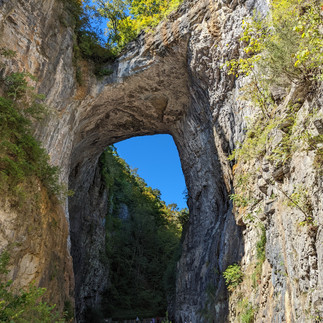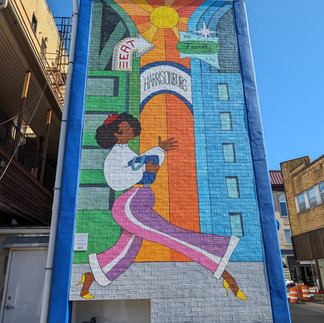It Takes a Valley
- Anika Horn

- Mar 19, 2024
- 5 min read
What to expect at the upcoming Startup Champions Network Summit

I (Anika Horn) have been attending Startup Champions Network (SCN) Summits for eight years, and when asked what’s best about them, my answer is always the same: The People.
Entrepreneurial ecosystem building is an emerging field and there’s a lot to learn; yet, I have found over the last eight years that the best way to learn is through talking with peers. Startup Champions Network is a grassroots network of 90+ entrepreneurial ecosystem builders from all around the U.S. who wake up every day to help entrepreneurs and innovators in their communities thrive. Twice a year we convene to exchange ideas, feedback, and advice on how to better support the dreamers and doers in the places we call home.
When the Shenandoah Community Capital Fund got approval to host the spring Summit for SCN, we knew we wanted to put our people at the center of the event. We’ve all been to conferences with long-winded panel discussions in windowless conference rooms that made us leave exhausted. For this Summit, we’re committing to minimizing panel discussions (we only have two!) and maximizing conversations.
We know from previous SCN Summits that the best knowledge transfer typically happens "around the water cooler." We catch up over session breaks and learn from each other while huddled around cups of coffee. From April 30th through May 2nd, 2024, that is the atmosphere we’re going to create for ecosystem builders in the Shenandoah Valley and our peers from around the country.
A showcase of placemaking and innovation in rural America
An ongoing challenge for us at SCCF, and within our ecosystem at large, is fighting the widespread misconception that technology is synonymous with innovation.
To break down this notion, we're introducing Summit attendees to local entrepreneurs with innovative products, services, and business models - some of which are strictly non-tech, and others that are tech-enabled. Innovation in rural America is more than technology and we are excited to showcase entrepreneurs who have not only successfully built but also scaled these innovative companies right here in the Shenandoah Valley.
On day one of the Summit, we will head to the Virginia Metalcrafters Marketplace, an icon of the rich history of craftsmanship in the Shenandoah Valley. Through an ambitious plan and belief in the power of place, the formerly dilapidated building complex on the outskirts of Waynesboro has been turned into the new home of small businesses, putting the town of 25,000 people back on the map. Day one will also give participants a chance to visit the Staunton Innovation Hub and learn about the expansion plans of their co-working model into other parts of the Valley.
On day two, attendees will tour the brand new Manufactory Collective in Harrisonburg, a manufacturing incubator that provides entrepreneurs with the tools, space, and ecosystem to prototype and scale their innovative products and services.
The idea of placemaking in and redevelopment of neglected parts of town is one of the main threads throughout the event. Our main Summit location, Liberty Street Loft, is a great example of economic revitalization and placemaking in northwest Harrisonburg. We are proud to welcome Summit attendees to this vibrant hub of small businesses and startups testing their products through short-term rental kiosks, accompanied by locally roasted coffee and baked goods.
A deep dive into local sub-ecosystems
As Director of Ecosystem Development for the Shenandoah Valley, I have deep insight into what’s working and what isn’t in our entrepreneurial ecosystem. With 100+ experts from around the country, we are leveraging their experiences and expertise to help us solve some of our most pressing local challenges:
The morning of day two is entirely devoted to getting us unstuck and learning best practices from our peers to help entrepreneurs in the Shenandoah Valley thrive.
We have asked local ecosystem accomplices to submit their most intractable challenges so that we can dissect the issue and find novel approaches to solve them in collaboration with Summit attendees. We believe that none of the challenges we face in the Valley are unique to our region. By pooling our knowledge and facilitating meaningful conversations, we can develop new perspectives and solutions that help move our entrepreneurs and ecosystem forward.
Rather than presentations and panel discussions, we will be hosting 10-12 local challenges to workshop possible solutions. Some of the Local Challenges are:
Re-launching the Shenandoah Valley’s tech ecosystem
How to grant more equitable access to capital for underserved entrepreneurs
Building the Black Business Ecosystem in Staunton - Augusta - Waynesboro
The role of higher education in innovation ecosystems
Seeding a micro tech and manufacturing ecosystem in a small town
Building meaningful relationships
The central theme of this Summit is It Takes a Valley, a nod to the fact that helping the dreamers and doers in our region thrive requires close collaboration among all accomplices in our ecosystem. And that collaboration cannot happen without a strong foundation of trust.
Several elements throughout the Summit are intentionally designed to facilitate meaningful conversations among attendees.
On day one, all attendees will learn to question power structures and hierarchies in ecosystems through a mass game of Cohado, developed by SCN’s own Paulo Gregory.
Following the Innovation Tour (see above), day one concludes with a Dinner with Locals in Staunton: In groups of 40, attendees have three dinner experiences to choose from. Each is hosted by an organization that is key to the local community in terms of the arts, social issues, and placemaking. Local hosts will share what they’re passionate about and challenge their dinner guests with one compelling question to guide their conversation throughout dinner.
On day 2, attendees will have the opportunity to share the Roses & Thorns of their work. Through facilitated conversation circles (and local picnic baskets!), these sessions are a staple at each SCN Summit to create a safe space for attendees to talk openly about their hopes and challenges surrounding their ecosystem efforts.
At registration, each attendee will receive not only their name tag but a traditional dance card to schedule 1:1 time with others throughout the Summit. We intentionally planned generous breaks to leave room for deeper individual conversations among attendees. We will equip each visitor with local downtown maps so they can explore local coffee shops, parks, and other local hotspots away from the conference buzz.
A Taste of the Valley
We are excited to show off the Shenandoah Valley not only in terms of our ecosystem but also by giving attendees a taste of our region.
Culturally, visitors can explore downtown Harrisonburg through a self-guided art walk or Duckling Hunt and discover Staunton through the Dragon Quest - organized by the Dragon Preservation Society of Staunton that will open their doors for SCN visitors on day one of the Summit (here’s a little preview).
We are proud that all meals and provisions will be catered by local chefs and restaurants to reflect our commitment to supporting our local economy. We are especially excited to host SCN’s 10th Anniversary Party on the evening of day two, catered by Kirsten Moore, host of the Sub Rosa Supper Club, and her team.
You can preview the full agenda here and familiarize yourself with the Shenandoah Valley ecosystem here. If you have questions about the SCN Summit, please contact Anika Horn.
Join the fun
Ready to get involved and acquainted with a national group of entrepreneur supporters and ecosystem builders? Join us for the Spring 2024 SCN Summit!

























Comments